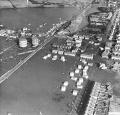 Today, in 1953, my dad left home. For three weeks we heard only rumours about his whereabouts. It was a worrying time, not just for my family but for thousands living on the east coast of England as high sea and wind combined with the high tide left a trail of death and disaster in the worst flooding in Britain in the last century.
Today, in 1953, my dad left home. For three weeks we heard only rumours about his whereabouts. It was a worrying time, not just for my family but for thousands living on the east coast of England as high sea and wind combined with the high tide left a trail of death and disaster in the worst flooding in Britain in the last century. During the night of January 31 floods claimed 307 lives, devastated 200,000 acres of farmland, swept cattle, horses, sheep and poultry to their deaths and 24,500 homes were damaged. There was no flood warning system in operation, so that it was not until the next morning that it was realised that the greatest peacetime catastrophe in this country in living memory had struck a normally peaceful countryside. Over 100 more lives were lost at sea, and 1,800 people were lost in Holland.
A hurricane lashed the North Sea until mountainous waves crashed against the sea wall defences along 1,400 miles of coastline, causing damage running into millions of pounds. It was a weekend of horror and heroism during which men gave their lives in attempts to rescue flood-beleaguered victims.
My dad worked for the gas supply company, and went to Harwich, the port on the other side of the estuary of the River Orwell opposite the port of Felixstowe. For three weeks he remained there, cutting off gas supplies and helping to rescue people. It was a hazardous business, and we were all glad when he finally came back home.
 Last night in Langer Road, the road that runs down the centre of the first picture, a small memorial to the victims of the flood was opened. In Felixstowe 41 people lost their lives, and this small memorial has been designed by local children, and may serve as a reminder.
Last night in Langer Road, the road that runs down the centre of the first picture, a small memorial to the victims of the flood was opened. In Felixstowe 41 people lost their lives, and this small memorial has been designed by local children, and may serve as a reminder.
Ironically our beloved government has just decided that the beach at Felixstowe does not need the flood protection local people are now asking for. The consciences of these faceless officials will quietly fade away when the next flood tide comes.
People pull together when facing such disasters, and a spirit of camaraderie manages to get most through the trauma. Today also marks the loss of 100 British soldiers in Iraq. Hardly anyone believes the loss of their lives has been worthwhile, any more than they do the over 2,000 US troops and an estimated 30,000 Iraqi citizens.
 As threatening noises are made at Iran's alleged attempt to protect itself from aggression perhaps we should all turn inward, and spend more time looking at what we have to do at home. Let the rest of the world look after itself for a while. It can manage without our help - or interference.
As threatening noises are made at Iran's alleged attempt to protect itself from aggression perhaps we should all turn inward, and spend more time looking at what we have to do at home. Let the rest of the world look after itself for a while. It can manage without our help - or interference.
1 comment:
From a story of domestic calamity and heroism to Iraq. Quite a leap.
Post a Comment